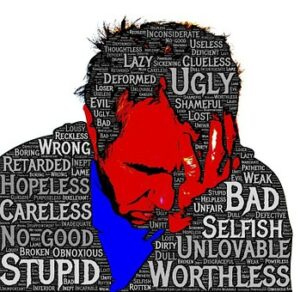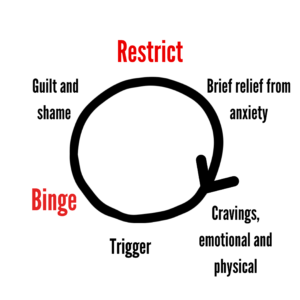Shame is a feeling that many of us deal with. It can be paralyzing because it’s not something we talk about openly and it has the power to cause deep shame in those that experience it. The cycle of shame can be a vicious one, where feelings that stem from shame lead to more shame until the victim becomes isolated and starts believing they’re unworthy.
Contents
What Is Shame?

We all feel ashamed at times, but what is it exactly? Shame is a feeling that can be hard to define. It’s a complex emotion that can be both painful and confusing. Shame can be caused by something we’ve done or something that has been done to us. It can stem from our own thoughts or from what others think of us.
A common example of this is bullying. When children are bullied they can feel shame, even if the actions that cause them to feel that way aren’t intentional on the part of their bullies. What makes shame so difficult is that it can be based on fear. Shame isn’t something we generally share with others because it’s hard to understand and it’s often accompanied by feelings of humiliation and isolation.
Effects Of Shame
 The effects of shame can be devastating. Shame can cause us to feel unworthy and isolated. It can keep us from seeking help or achieving our goals. Shame can lead to depression, anxiety, low self-esteem, and even suicide.
The effects of shame can be devastating. Shame can cause us to feel unworthy and isolated. It can keep us from seeking help or achieving our goals. Shame can lead to depression, anxiety, low self-esteem, and even suicide.
It can have a number of negative effects on both our mental and physical health. Shame can lead to depression, low self-esteem, and even suicidal thoughts. It can also cause us to isolate ourselves from others, which only makes the feelings of shame stronger. Shame can also affect our physical health, causing us to experience things like pain, heart problems, and even autoimmune diseases.
Shame can have a range of negative effects on the victim. It can cause them to feel deeply ashamed and embarrassed of themselves. This can lead to feelings of self-hatred and make it difficult for them to trust others. Shame can also cause the victim to become isolated, as they may feel that no one wants to be around them.
It’s also important to note that the effects of shame can vary depending on how someone was shamed. For example, shaming someone for their weight may cause them to engage in unhealthy eating habits. This is because they see food as a comfort and become addicted to it.
Causes Of Shame
There is no one answer to this question because shame can be caused by so many different things. Some of the most common causes of shame are:

- Sexual abuse or assault
- Physical abuse
- Emotional abuse
- Bullying
- Racial discrimination
- Weight issues
- Social isolation
Cycle Of Shame
Shame can also cause someone to become stuck in a cycle of shame where they simply repeat the same behavior over and over again. This is because they’re unable to move on from what caused them shame in the first place.
How To Break The Cycle Of Shame?
The first step in breaking the cycle of shame is to understand that shame is not our fault. Shame is an emotion that is often based on fear or on false beliefs about ourselves. Once we understand that, we can start to accept ourselves for who we are and realize that those false beliefs don’t have to control our lives. We may not always be able to change the things that cause us pain or feelings of shame, but we can learn how to be happy again. Breaking free from this cycle of shame isn’t easy, but it is possible. Here are some other tips on breaking the cycle:

- Set realistic expectations for yourself and try not to put too much pressure on yourself.
- Talk to someone about how you’re feeling, whether it’s a friend, family member, or therapist.
- Challenge the negative thoughts that are causing you shame.
- Try to find something that brings you joy and focus on that.
- Be kind to yourself, even when you’re in the middle of a shame cycle. If you’re having trouble doing this, it may be helpful to treat yourself like you would your friend who was going through the same thing.
- Identify the things that make you feel ashamed. This can be difficult, but it’s important to identify what is causing those shameful feelings.
- Talk about your shame with someone you trust. This can be hard, but it’s an important step in healing.
- Look for positive things about yourself and keep them in mind. Remind yourself of the good parts of who you are and commit to working on what makes you feel shameful.
- Exercise and eat well. By focusing on these healthy habits, it can make it easier for you to let go of shame as you reach your goals.
Ways To Feel Better About Yourself Again

There are a lot of ways you can start to feel better about yourself. The key is to remember that this journey won’t be easy, but it’s well worth it. Once we’ve identified what’s causing our feelings of shame and why we can start finding ways to start feeling better. This may include things like:
- Identify what makes you feel ashamed and work on those things. This could mean going back to school or getting a part-time job to improve your self-esteem.
- Join a support group or talk to a therapist about the things that are causing you shame. This can be an important step in working through those feelings.
- Find ways to enjoy life and do things that make you happy. This can be anything from reading books to taking walks in nature.
- Talk to your friends and family about what’s going on. Having a support system can be beneficial.
- Focus on being productive rather than dwelling on the things that make you feel ashamed. By focusing on doing good work, it can help you move forward in life without feeling trapped by your shame.
- Expressing yourself creatively, whether it’s writing, painting, or dancing.
- Find a support group for people who have gone through something similar to what you’re experiencing.
- Spending time in nature.
- Journaling
- Meditating or practicing mindfulness.
Self-destructive Behaviors That Shame Underlies
There are a number of self-destructive behaviors that shame can underlie. Some of the most common ones are:

- Eating disorders
- Drug and alcohol abuse
- Suicidal thoughts and behavior
- Addictive behavior
All of these behaviors can be harmful to the individual and can cause them to spiral out of control. The key is to get help if you’re struggling with any of these issues. Talk to someone you trust about what’s going on and seek professional help. You don’t have to struggle on your own.
Therapy For Breaking Shame Cycle
Shame can be a paralyzing feeling because it’s not something we talk about openly and it has the power to cause deep shame in those that experience it. The cycle of shame can be a vicious one, where feelings that stem from shame lead to more shame until the victim becomes isolated and starts believing they’re unworthy. Therapy can help you deal with the root cause of shame and help move on.
The good news is that we can break the cycle of shame and start to feel better about ourselves again. It takes time, patience, and effort, but it’s definitely possible. Remember that you’re not alone in this and there are people who care about you and want to help.
If you’re feeling lost or don’t know where to start, please don’t hesitate to reach out for help. You’re worth it.
Conclusion
After experiencing something that makes you feel ashamed, it can take a lot of work to move forward in life. That being said, it is important that you stay strong and remember that there are people who are rooting for your success. This isn’t the end of the road for you, it’s simply another stepping stone on your path towards self-improvement.
If you are looking for affordable Online Counseling MantraCare can help: Book a trial therapy session


